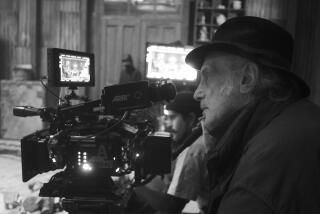Two of Tarkovsky’s Best on Tap at New Beverly
Andrei Tarkovsky, who died of cancer in Paris in 1986 at age 54, was one of the world’s greatest filmmakers, a man of profound vision and surreal style. Plagued by censorship in Soviet Russia and eventually driven into exile, Tarkovsky, in a demonstration of awesome will, managed to create a substantial, utterly idiosyncratic body of work. On Wednesday and Thursday the New Beverly Cinema will present Tarkovsky’s “The Mirror” (1975-78) and his valedictory, “The Sacrifice” (1986).
The title of the shimmering, enigmatic “The Mirror” (screening at 7:30 p.m.) could easily refer to art itself in its ancient function of holding up a reflection to nature so that we may see ourselves in it. With Tarkovsky, however, there’s always a desire to see beyond this world into others, in this instance, in the past, evoked through memory, imagination and dreams.
Tarkovsky shifts between black-and-white and color, between past and present, in so intensely a personal way that it becomes beside the point--and also futile--to try to make distinctions. It’s best to go with the film’s gorgeous flow, connecting with it emotionally rather than rationally.
“The Mirror” is above all an expression of longing for the past, specifically for a mother’s love (and trying to find it in a wife), and a return to a Garden of Eden-like existence. But this is also a film with a double vision: While expressing that childhood desire for security that seems to remain in us always, it perceives its people from an adult perspective, and for all its luminosity, some of its memories are fear-laden and tragic.
Tarkovsky’s films invite us to experience what we’re seeing, to perceive a universe in which the line blurs between the natural and the supernatural. This radiant, sublime dream of a film begins with a televised scene of a therapist in the process of curing a stuttering young boy. If we are to take this scene as a metaphor, then the film can be regarded as the work of a man who has found his voice and learned to express himself in his own powerful way.
Near the beginning of “The Sacrifice” (9:35 p.m.), Tarkovsky’s great meditation on the imperiled future of humanity, a middle-aged man is planting a tree by the sea, telling his small, mute son that if he waters it every day at the same time surely the world will change.
The film ends with a shot of the boy watering the fragile sapling. These two sequences bracket Tarkovsky’s finest work, a culmination of all that preoccupied him throughout his films.
The setting of “The Sacrifice,” which was made in Sweden, is a handsome house and swampy grounds--all the better for Tarkovsky’s famous water images--in a remote region by the sea.
It is the birthday of its owner Alexander (Erland Josephson), who is in a reflective mood, wondering whether he’s accomplished anything in life. In a long dialogue with a mystical friend (Allan Edwall), he reveals concern for the imbalance of the spiritual and the material in our lives.
Tarkovsky proceeds to spin an enigma, leaving us to wonder whether what follows is Alexander’s dream, a false alarm that World War III has started, or an actual crisis, inexplicably resolved.
By the time “The Sacrifice” comes full circle it emerges itself as a symbolic gesture of great emotional impact. We may share Alexander’s sense of impotence, but Tarkovsky turns such feelings into a work of art. In the face of despair, the “hope and confidence” with which Tarkovsky dedicates his film to his own son, he makes “The Sacrifice” a gift to us all.
Information: (213) 938-4038.
More to Read
Only good movies
Get the Indie Focus newsletter, Mark Olsen's weekly guide to the world of cinema.
You may occasionally receive promotional content from the Los Angeles Times.










